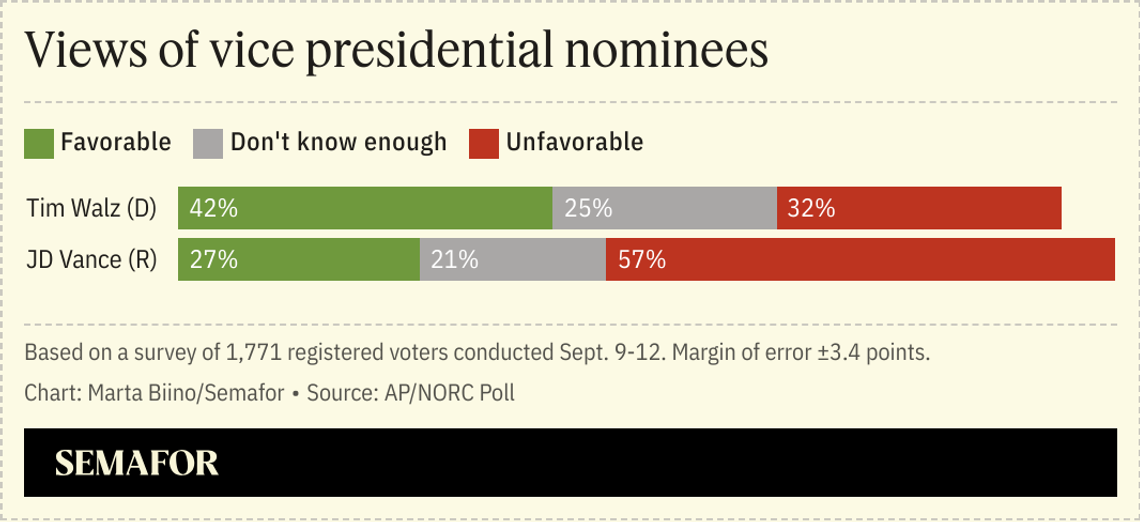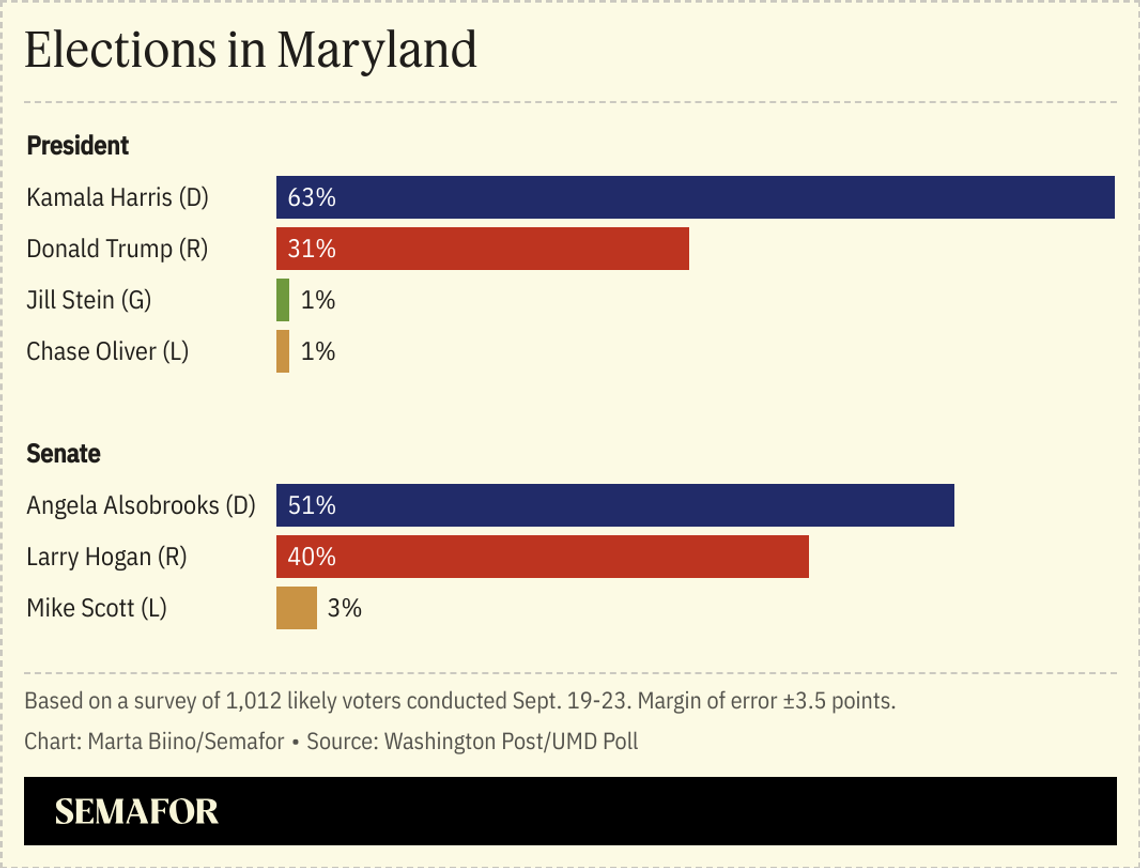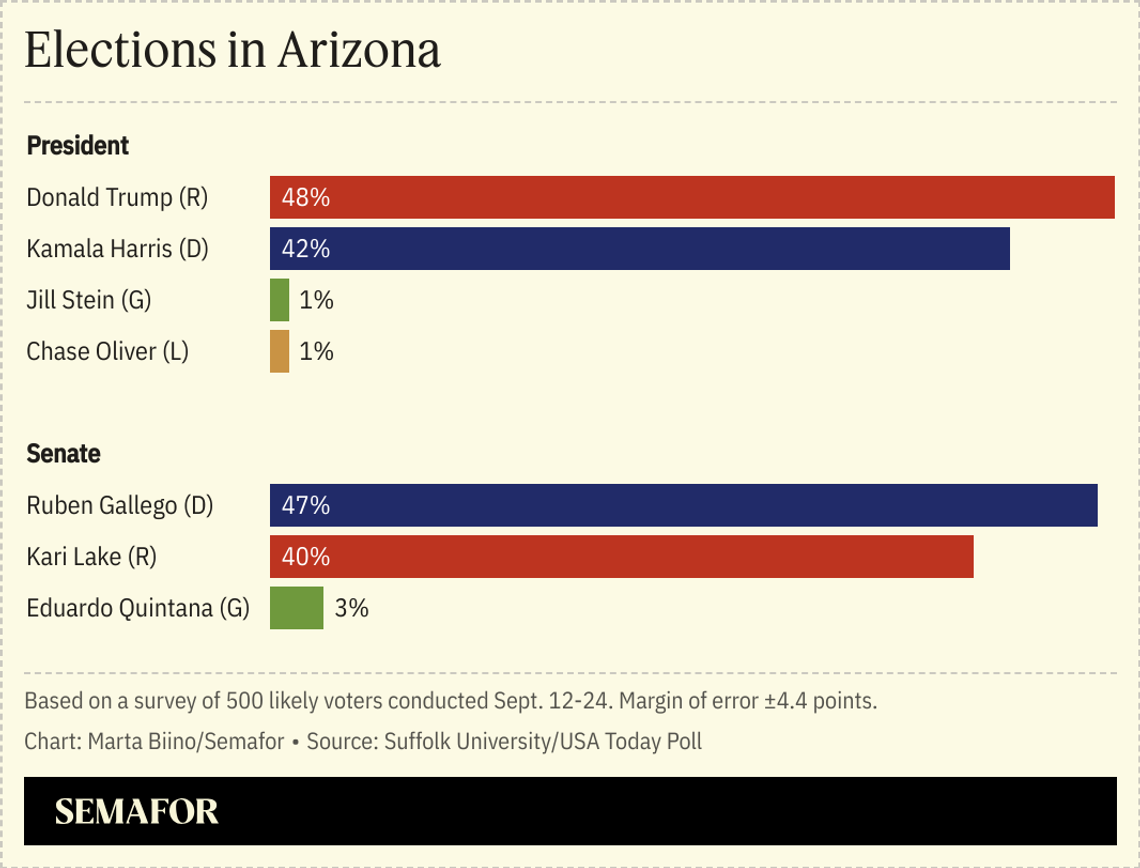 Polls Since he was added to the GOP ticket, Vance has consistently polled worse than Trump; since Walz joined the Democratic ticket, he’s polled far better than Vance. No other poll has found a discrepancy this wide, but the cross-tabs explain what’s happening: Trump has made some inroads with non-traditional Republican voters who aren’t interested in Vance. He runs 13 points worse than Trump with Hispanic voters and 6 points worse with Black voters. Vance heads into Tuesday’s debate as the heavy underdog in public image, even though both parties have been impressed with how he carries himself in those formats.  Democrats are trying to expand their Senate targets right now, but they aren’t very worried about protecting a left flank in Maryland. Their theory of this race, six months ago, was that Hogan ended his two terms as governor with high approval ratings that wouldn’t stand up in a federal election, and that any Democratic nominee would rise as they got better known. Tens of millions of dollars in ads later, most of them from Hogan and allies, the theory is bearing out. Alsobrooks’ +28 favorable rating is now comparable to Hogan’s, at +26 — and that’s Hogan’s worst favorable rating since he won the governor’s mansion in 2014. Despite Hogan’s promise not to support new abortion limits, Alsobrooks leads him by 29 points on that issue. Polling also underrated Hogan in his 2014 race, and internal GOP numbers are better for him, but he has never run in an electorate this big. In 2018, he won a landslide re-election with fewer than 1.3 million votes; in 2020, 3 million Marylanders cast ballots.  Polling over the last week has found Trump running better in Arizona than in any sunbelt swing state, while his handpicked Senate candidate continues to trail there. The simple explanation here: Voters like Trump and are nostalgic for his presidency in Arizona, while they don’t like Kari Lake, who lost the 2022 race for governor and still hasn’t conceded it. Harris and Lake have the same unfavorable rating of 53%, and Harris leads with Latino voters by just 12 points, half of the winning Biden margin in 2020. Gallego, who has led Lake all year, leads with that part of the electorate by 25 points. Ads Lori Chavez-DeRemer/YouTube Lori Chavez-DeRemer/YouTube- NRCC and Lori Chavez-DeRemer, “Safer Oregon.” Democrats helped Rep. Janelle Bynum win a swing seat primary because they worried that a left-wing candidate would blow it. Republicans only slightly tweaked their strategy: This ad links Bynum to the criminal justice and drug reform policies supported by ex-Gov. Kate Brown, warning that she joined Democrats to “let violent criminals out of jail.”
- NRCC, “The Only One.” Last year, most House Democrats and all but one Republican voted for the HALT Fentanyl Act, permanently raising penalties for possession or trafficking of the drug. Connecticut Rep. Jahana Hayes, like most non-white and urban district Democrats, opposed it over worries about racial sentencing disparities. Here, the “no” vote is enough to link Hayes to the “epidemic” of overdoses: “How many have to die?” appears on-screen as Hayes laughs and smiles.
- Senate Leadership Fund, “Detained.” The story of Juan Ramon-Vasquez made headlines in Philadelphia for two years — an illegal immigrant from Honduras who got out of jail after the city didn’t cooperate with ICE, then went on to commit brutal rapes. In 2019, the city’s Trump-appointed U.S. attorney, who’d later run for governor, blamed Philadelphia’s “sanctuary city policies.” This spot against Sen. Bob Casey quotes that statement and assigns blame to the senator, who hasn’t supported the sanctuary city restrictions Republicans keep introducing in the Senate.
Scooped!This already got a mention at the top of the newsletter, but Alex Thompson’s stories about what Harris has and hasn’t stuck with — irritating though they may be to Democrats — are putting together a clear narrative about how her party changed. The most recent example: Harris declining to weigh in on the death penalty. It made very little news when Democrats erased their opposition to the death penalty in the 2024 platform, looking to get ahead of a more crime-focused cycle. But the party’s decision represented a dramatic shift for Harris, who nearly lost her 2010 attorney general race over her refusal to seek the death penalty as district attorney — which she tempered with a pledge to enforce the law as applicable in state cases. Next - four days until the CBS News vice presidential debate
- 39 days until the 2024 presidential election
- 81 days until the Electoral College votes
David recommendsI saw a screener of “The Apprentice” this week, the Ali Abbasi/Gabe Sherman biopic about Donald Trump’s formative relationship with Roy Cohn. It makes sense that the Trump campaign wanted to block it. No voter on the fence will go MAGA after watching Sebastian Stan’s Trump learn how to be a “killer” from Cohn, or seeing a young Roger Stone get introduced as a specialist in “dirty tricks.” When it’s over, you might wish that there was more of Jeremy Strong’s Cohn and fewer re-enactments of Trump’s Greatest Hits. But it’s a good addition to the burgeoning Trump Cinematic Universe. |